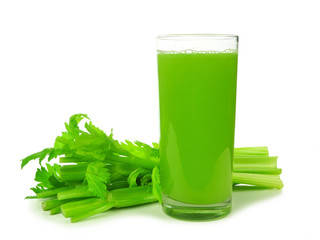The Liver-Boosting Power of Celery Juice: Unveiling the Green Elixir
Introduction:
In recent years, celery juice has gained immense popularity as a health elixir, with proponents claiming various benefits, including improved liver health.
This article aims to delve into the potential advantages of consuming celery juice, specifically focusing on its impact on the liver. From its nutritional composition to its purported detoxifying effects, we will explore the reasons behind the growing trend of incorporating this green juice into daily routines.
The Nutritional Powerhouse:
Celery is more than just a crunchy snack; it's a nutritional powerhouse. Rich in vitamins, minerals, and antioxidants, celery provides a range of essential nutrients that contribute to overall health.
Among its key components are vitamin K, vitamin C, potassium, and folate. These nutrients play crucial roles in supporting bodily functions, including those related to liver health.
Detoxification and Liver Function:
One of the primary claims associated with celery juice is its detoxifying properties. The liver, a vital organ responsible for detoxifying the body, plays a central role in filtering and eliminating toxins.
Proponents argue that celery juice aids in this detoxification process by promoting the production of liver enzymes and enhancing overall liver function. But how valid are these claims?
Antioxidants and Anti-Inflammatory Compounds:
Celery contains antioxidants, such as flavonoids and polyphenols, which can help combat oxidative stress and inflammation. Chronic inflammation is linked to various liver conditions, including fatty liver disease and cirrhosis.
By incorporating celery juice into your diet, you may introduce these anti-inflammatory compounds, potentially supporting liver health and mitigating inflammation-related damage.
Hydration and Liver Well-Being:
A well-hydrated body is essential for optimal liver function. Celery juice, composed mainly of water, can contribute to overall hydration. Proper hydration supports the liver in flushing out toxins and maintaining its efficiency in various metabolic processes. We will explore the intricate relationship between celery juice and hydration and how it influences liver well-being.
Managing Cholesterol Levels:
Elevated cholesterol levels can pose a risk to liver health. Preliminary studies suggest that certain compounds found in celery, such as phthalides, may contribute to lowering cholesterol. We will examine the scientific evidence behind these findings and discuss the potential impact of celery juice on cholesterol levels and its implications for liver health.
Balancing Blood Sugar Levels:
Stable blood sugar levels are crucial for preventing conditions like non-alcoholic fatty liver disease (NAFLD). Some proponents of celery juice argue that it may help regulate blood sugar levels. We will explore the scientific basis for these claims and discuss how maintaining balanced blood sugar levels could positively affect liver health.
Potential Drawbacks and Considerations:
While celery juice has its merits, it's essential to consider potential drawbacks and limitations. Excessive consumption may lead to unintended consequences, and individual responses can vary. We will address common concerns, such as excessive sodium intake and the importance of moderation in incorporating celery juice into one's diet.
Conclusion:
In conclusion, the growing popularity of celery juice is not merely a passing trend. With its nutrient-rich composition, potential detoxification benefits, and impact on factors like inflammation and cholesterol levels, celery juice may indeed offer support to liver health.
However, it's crucial to approach such claims with a critical mindset and understand that while celery juice can be a valuable addition to a balanced diet, it is not a panacea. Consulting with healthcare professionals and adopting a holistic approach to liver health through diet and lifestyle remains key.
- What is the main focus of the article "The Liver-Boosting Power of Celery Juice"?
- How is celery juice described in the article?
- Why is the term "Green Elixir" used to describe celery juice in the context of liver health?
- Are there specific benefits mentioned in the article regarding celery juice and liver function?
- Does the article provide any recommendations or guidelines for incorporating celery juice into one's diet for liver health?





.png)



0 Comments
please do not enter spam link in the comment box.